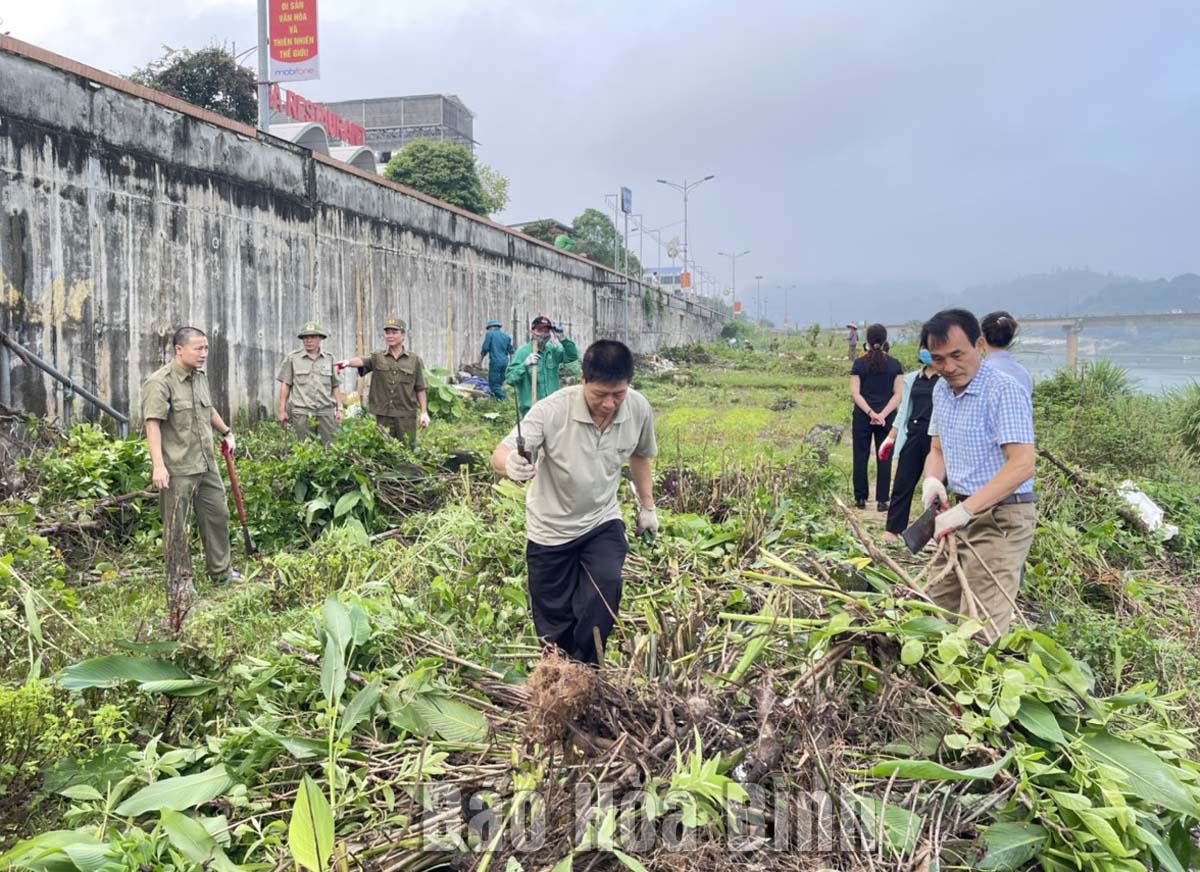
(HBO) – The Hoa Binh provincial People’s Committee issued Decision No 1966/QĐ-UBND on September 9, 2022, that approved a plan to develop the nigh-time economy in Hoa Binh city. This plan will be carried out in Phuong Lam and Dong Tien wards, along the Da Giang dyke.
Cadres and residents in Dong Tien ward clean up the environment to ready the site for implementing the night-time economy plan in Hoa Binh city.
The plan aims to promote tourism and service sectors and create jobs for local people. It targets that production value in the trade, service and tourism sectors in the nigh-time economic zone will grow by 20% annually. Service and trade revenue in the zone is hoped to reach 500 billion VND (20 million USD) each year by 2023, accounting for 20 - 25% of the total in Phuong Lam and Dong Tien wards. The zone is expecting to attract 500,000 tourists per year while the length of visitors’ stay will extend, to 1.5 days among Vietnamese visitors and two days among foreigners.
Do Thi Loan, a cadre of the division for economic and infrastructure affairs of Hoa Binh city, said the city boasts sufficient infrastructure conditions for developing the nigh-time economy.
By the end of 2021, it had 1,279 enterprises, 62 cooperatives, and 7,644 business households, more than 50% of which engage in trade, services, transportation, and tourism. There are 379 establishments providing food and beverage services at present, including 10 restaurants eligible for receiving tourists and nearly 80 supplying night-time food and beverage services (after 8pm), mostly in Phuong Lam, Dong Tien, and Quynh Lam wards.
However, she also admitted the modest size and quality of those establishments, along with a lack of a concentrated and large night-time food zone.
To develop the night-time economy, the Hoa Binh municipal People’s Committee identified several tasks, including stepping up the dissemination of legal regulations on urban security and order, food safety, and environmental hygiene; boosting night-time economic activities in combination with safeguarding political security and social order and safety; increasing communications to raise service providers’ awareness of business ethics; forming the connectivity among stakeholders; and maximising functions of the night-time economic zone. Besides, authorities will also encourage local amateur singing and dancing teams to hold regular performances of traditional culture in the zone./.
Playing a key role in Hoa Binh province’s economic development, Luong Son district has been focusing on science and technology development, innovation, and digital transformation.
Identifying the application of online public services as a key step in administrative procedure reform and e-government building, Kim Boi district has proactively provided services and supported residents and businesses in accessing and utilising full-process online public services promptly and efficiently. The locality aims to lift the rate of end-to-end online public services to over 90%, with all officials and civil servants handling tasks in the digital environment.
Nguyen Anh Tuyet, hailing from a family steeped in the ancient art of herbal medicine, is transforming local medicinal herbs into high-value concentrated extracts, elevating their worth and healing potential.
Nguyen Phi Long, an alternate member of the Party Central Committee, Secretary of the Hoa Binh provincial Party Committee, and head of the steering committee for the province's key projects, chaired a conference on March 25 to discuss measures for implementing the project on constructing the Hoa Lac - Hoa Binh road and upgrading the Xuan Mai - Hoa Binh section of National Highway 6 under the public-private partnership (PPP) model.
Administrative reform has been identified as a key priority in enhancing state governance, improving the business environment, and facilitating services for citizens and enterprises.
The Standing Board of the Hoa Binh provincial Party Committee met on March 18 to review and guide major investment projects aimed at boosting local socio-economic development.



